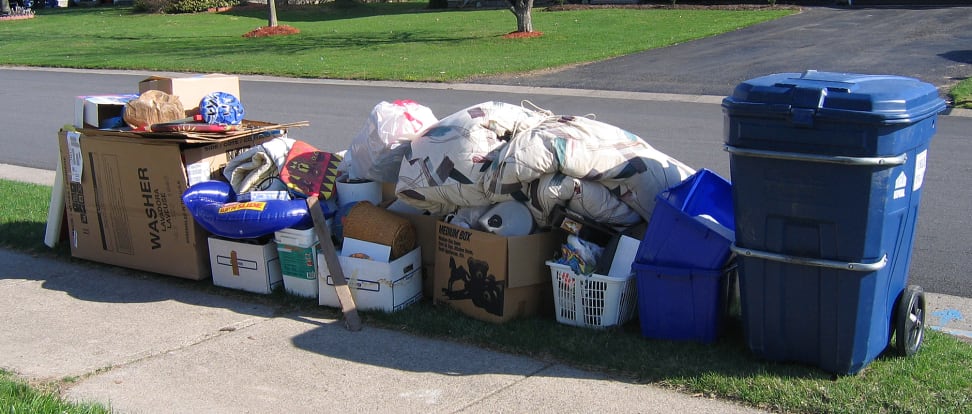 Credit:
Credit:
Products are chosen independently by our editors. Purchases made through our links may earn us a commission.
If you're doing spring cleaning right, you should be throwing a bunch of stuff away. That treadmill just takes up space and makes a terrible coat rack, and no one really needs four toasters. Chucking stuff out is half the fun of spring cleaning, and for most items, it's a simple matter of hauling it out to the sidewalk on garbage day.
But not all trash is created equal, and some requires special treatment for proper disposal. What do you need to look out for? Batteries, electronics, and certain household chemicals. The U.S. Environmental Protection Agency (EPA) considers all of these to be hazardous materials that can potentially harm the environment, so it's illegal to dump them along with your regular trash.
It may not be immediately obvious why these things are considered hazardous, so let's take a closer look at each of them. While we're at it, we'll also give you the EPA's recommendations on how to properly throw this stuff out.
Batteries
You've probably seen (and maybe even ignored) the warning labels on all the batteries you've purchased. These ubiquitous little power sources are considered hazardous because of the heavy metals they contain. Common metals found in batteries include mercury, cadmium, nickel, and lead, which can cause some serious problems if they're dumped in a landfill and seep into the groundwater.
To properly dispose of these common items, you'll have to check with your city or town's Department of Public Works (or similar agency) to see how it handles hazardous waste disposal. In most major cities—like Reviewed.com's hometown of Boston—there are hazardous waste drop-offs for residents. Depending on where you live, though, you might have to take a trip to your local Public Works office with a bucket full of dead batteries.
Electronics
Smartphones have become our primary source of entertainment on-the-go, and many of us go through them like pairs of socks. So there's a pretty good chance you have some obsolete pieces of mobile tech lying around. Older cell phones, MP3 players, and laptops are relics of a bygone era, and it's tempting to throw them out with your regular trash.
These devices are considered hazardous for many of the same reasons as batteries: In fact, they often contain a built-in rechargeable battery. Toxic heavy metals can contaminate soil and nearby sources of water, which is why there are laws to try to prevent them from ending up in landfills.
Recycling these mobile devices—along with some heavier items such as TVs, monitors, desktop PCs, and printers—is the proper way of disposing them. The National Center for Electronics Recycling has a few tips on how to do just that. In addition to what city services offer for "eCycling," there are also EPA-certified third-party organizations that will take your e-waste.
If your gear is still in good shape, you should also consider donating older electronics to charitable organizations. Likely candidates include your local Goodwill or Salvation Army, Cell Phones for Soldiers, and the National Coalition Against Domestic Violence. If none of those tickle your fancy, you can always trade in your functioning electronics at retailers like Amazon, Best Buy, or Staples, and then donate the cash to a charity of your choice.
Household Hazardous Waste
The cleaning supplies, paint, and other chemicals that you have stored under the kitchen sink or in the garage are all hazardous (if the "KEEP AWAY FROM CHILDREN" labels didn't already tip you off). The EPA refers to these common items as household hazardous waste (HHW), and advises against pouring them down a sink, in the sewers, or on the ground outside.
Unlike the previous two categories, HHWs are generally allowed to be thrown out with regular trash. However, some cities have HHW collection programs separate from regular waste collection to reduce the risk of HHWs igniting, leaking, exploding, or mixing with other chemicals. Check to make sure you're following the rules where you live, especially if you're dealing with a damaged container.
Sources and additional information:
- U.S. Environmental Protection Agency List of Common Waste and Materials
- Natural Resources Defense Council
- Short List of Common Household Hazardous Waste
Hero Image: Flickr user "liz" (CC BY-SA 2.0)
